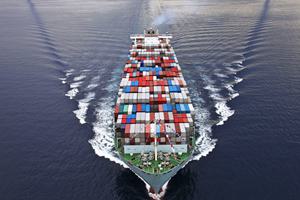In Oceans
Marine Pollution
-
Artificial Islands
The Rising Environmental Toll of China’s Offshore Island Grab
-
Why Ocean Health Is Better And Worse Than You Think
The good news is the world’s oceans have not experienced the extinctions that have occurred on land. But as ecologist Douglas McCauley explains in a Yale Environment 360 interview, marine life now face numerous threats even more serious than overfishing.
-
Oyster Aquaculture Offers Hope for Louisiana Fishery and the Gulf
Last year’s oil spill in the Gulf of Mexico severely damaged Louisiana’s oyster beds, one of the world’s last thriving wild oyster fisheries. In a Yale Environment 360 video, journalist Jon Brand reports on an experimental oyster farm in Louisiana that offers hope for a smoother recovery for the Gulf’s oysters and its oystermen.
-
One Year Later: Assessing the Lasting Impact of the Gulf Spill
On the anniversary of the Deepwater Horizon explosion, the worst fears about the long-term damage from the oil spill have not been realized. But the big challenge is more fundamental: repairing the harm from the dams, levees, and canals that are devastating the Mississippi Delta and the Louisiana coast.
-
Fukushima
Radioactivity in the Ocean: Diluted, But Far from Harmless
With contaminated water from Japan’s crippled Fukushima nuclear complex continuing to pour into the Pacific, scientists are concerned about how that radioactivity might affect marine life. Although the ocean’s capacity to dilute radiation is huge, signs are that nuclear isotopes are already moving up the local food chain.
-
Panel Chief on the Gulf Spill: Complacency Led to Disaster
William Reilly led the national commission that investigated the Deepwater Horizon oil spill and says he was struck by the totally inadequate response plans that were in place. In an interview with Yale Environment 360, he talks about why it’s crucial to carry out the reforms needed to prevent future disasters.
-
Is the End in Sight for The World’s Coral Reefs?
It is a difficult idea to fathom. But the science is clear: Unless we change the way we live, the Earth's coral reefs will be utterly destroyed within our children's lifetimes.
-
China Turns to Biogas to Ease Impact of Factory Farms
In China, millions of tons of waste from livestock farms are causing severe water pollution and massive emissions of methane. Now, some large livestock operators are turning to biogas fuel production in hopes of creating “ecological” factory farms.
-
The Legacy of the Gulf Spill: What to Expect for the Future?
The Gulf of Mexico’s capacity to recover from previous environmental assaults — especially the 1979 Ixtoc explosion — provides encouragement about the prospects for its post-Deepwater future. But scientists remain worried about the BP spill's long-term effects on the health of the Gulf and its sea life.
-
A Louisiana Bird Expert Assesses Damage from the Spill
The images of pelicans and other Gulf of Mexico seabirds drenched in oil have stirred sadness and outrage around the world. But, says conservationist Melanie Driscoll, the unseen effects are probably far greater, with some birds perishing out of sight, far from shore, and others facing spill-related declines in the fish on which they depend.
-
As the Far North Melts, Calls Grow for Arctic Treaty
The massive oil spill in the Gulf of Mexico is a warning, conservationists say, of what could happen in the Arctic as melting sea ice opens the Arctic Ocean to oil and gas drilling. Many experts argue that the time has come to adopt an Arctic Treaty similar to the one that has safeguarded Antarctica for half a century.
-
The Oil Spill’s Growing Toll On Sea Life in the Gulf of Mexico
A prominent marine biologist says the impacts of the oil gushing into the Gulf of Mexico will persist for years, no matter when the flow finally stops. What’s more, scientist Thomas Shirley says that most of the damage remains out of sight below the surface, as creatures succumb to the toxic effects of the rapidly spreading tide of oil.
-
Under Pressure to Block Oil, A Rush To Dubious Projects
In response to the widening disaster in the Gulf of Mexico, government officials have approved a plan to intercept the oil by building a 45-mile sand berm. But scientists fear the project is a costly boondoggle that will inflict further environmental damage and do little to keep oil off the coast.
-
Anatomy of the BP Oil Spill: An Accident Waiting to Happen
The oil slick spreading across the Gulf of Mexico has shattered the notion that offshore drilling had become safe. A close look at the accident shows that lax federal oversight, complacency by BP and the other companies involved, and the complexities of drilling a mile deep all combined to create the perfect environmental storm.
-
Under Threat in the Gulf, A Refuge Created by Roosevelt
Among the natural treasures at risk from the oil spill in the Gulf of Mexico is the Breton National Wildlife Refuge, created by Theodore Roosevelt to halt a grave threat to birds in his era — the lucrative trade in plumage. Now, oil from the BP spill is starting to wash up on beaches where Roosevelt once walked.
-
An Ominous Warning on the Effects of Ocean Acidification
A new study says the seas are acidifying ten times faster today than 55 million years ago when a mass extinction of marine species occurred. And, the study concludes, current changes in ocean chemistry due to the burning of fossil fuels may portend a new wave of die-offs.





